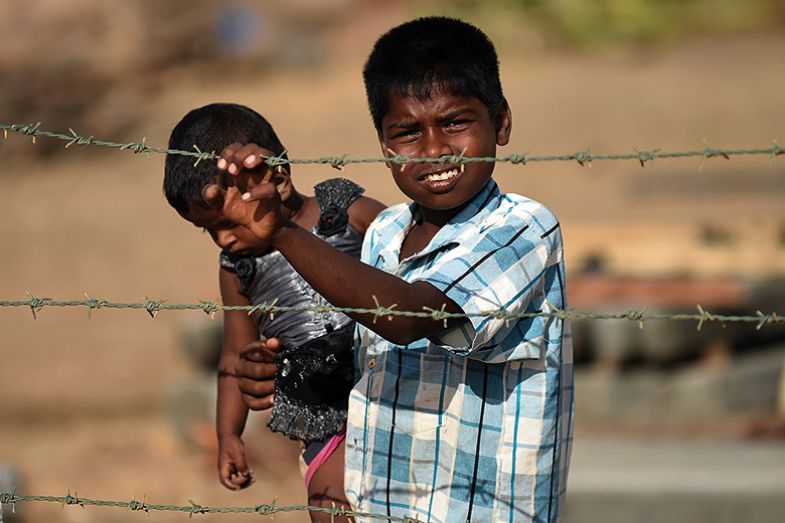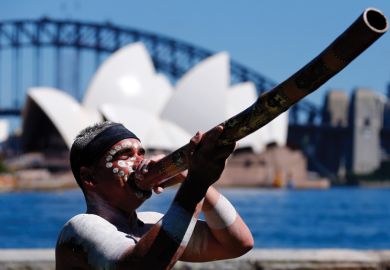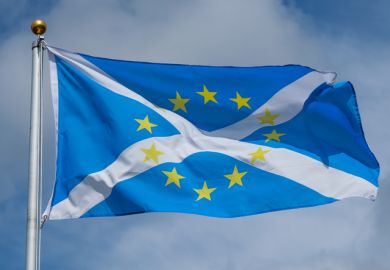“There has never been a more pressing time” to ask questions about peace and reconciliation, according to Joanna Newman, chief executive and secretary general of the Association of Commonwealth Universities (ACU).
In parts of the world, “borders [are] closing, and so are minds”, Dr Newman said. “Universities have a role to keep minds and borders open. Yet universities are also part of countries [and] regions that have experienced violent conflict, colonial oppression, the eradication of indigenous languages and rights.”
Such circumstances have raised a number of core issues, Dr Newman went on, about how universities should “reflect the world today in their curricula”, and “the role they should play in reconciliation”. It is such concerns that have led the ACU to develop plans for a new Peace and Reconciliation Network, launched last week at the University of Melbourne.
“There was a really big response to our call,” reported Dr Newman, and “more than 30 countries and 60 institutions wanted to attend”, although “visas for some of the African delegates were late or didn’t come at all”.
At the event, a highly diverse group of 30 delegates – from Australia, Canada, Fiji, India, Kenya, Malawi, New Zealand, Kenya, Papua New Guinea, Sri Lanka and the UK – were able to attend “a scoping meeting, to determine what the network is going to deliver and what we want it to do”. Host Shaun Ewen, Melbourne’s pro vice-chancellor (Indigenous), will serve as its first chair.
Some delegates already have extensive experience of addressing historic injustices.
Victoria Haskins is co-director of the Purai Global Indigenous and Diaspora Research Studies Centre at the University of Newcastle, Australia. This centre “provides a national and international network of researchers who work in the areas of indigenous and diaspora studies, and other topics that touch on issues of race and society”.
She and fellow director John Maynard have carried out research on the history of the New South Wales Aborigines Protection/Welfare Board and co-authored a book on “the experiences of non-Indigenous people who were taken in by Aboriginal and Torres Strait Islander communities in the early colonial period”, which has “a strong reconciliation message and has reached a wider audience through the Australian Broadcasting Corporation radio podcasts”, Professor Haskins said.
Newcastle’s Centre for the History of Violence has produced an interactive map of historical massacres of Indigenous people in Australia, while architectural students, according to Professor Haskins, have been helping to “design infrastructure for community centres and town camps in the central Australian township”.
Yet although an “international network” is already at the heart of the work of the Purai Centre, she added, the new network would enable the centre to ramp up its activities through developing further research partnerships and “providing a collegial space for researchers visiting us from other Commonwealth countries for the purposes of researching indigenous topics and race/diaspora issues, including issues around refugees and transnational issues of race”.
For Krushil Watene, a senior lecturer on the philosophy programme at Massey University in New Zealand, an important thread of the discussions at Melbourne had been “addressing the need to recognise the significance of indigenous philosophies, and highlighting the importance of indigenous concerns. A central focus here centres on our willingness to face our histories and contemporary realities – of oppression, subjugation, persecution – in ways that create real space for new beginnings.”
Given that “reconciliation is centrally about improving and transforming relationships”, Dr Watene said she believes that “the network provides a platform for doing this by bringing together perspectives and experiences that might not otherwise have the opportunity to engage, leading to deeper conversations with scholars, activists and communities themselves – and to enhanced conceptions and understandings of reconciliation, restorative and transitional justice in Commonwealth countries”. It should also “generate important resources for teaching and learning at undergraduate and postgraduate levels”, she added.

While acknowledging “the specific benefits and specific learnings that can come from a regional approach to peace and reconciliation”, Professor Ewen said that the new ACU network still offers a “unique value proposition” through providing “a shared engagement with the [whole] Commonwealth”, based on “a historical experience of empire”, but also offering “a diverse, unique and local set of contexts within which to share, and learn”.
Yet this raises an obvious question. The “historical experience of empire” hardly played out in the same way across the different territories of the Commonwealth, so isn’t there a danger of a north-south divide within attempts at forging academic partnerships, particularly when addressing contentious political themes around the legacy of colonialism and indigenous rights?
In response to this, Dr Newman stressed that “many of the issues discussed [at Melbourne] were common across all continents and situations, whether rich or poor. They include issues like widening participation, [developing curricula that support] marginalised groups to engage with learning, and values such as how traditional knowledge systems are valued and taught in academia.” Indeed, peace and reconciliation seem to her to cut across “traditional dialogues of development”.
Dr Newman cited the case of a Kenyan delegate who “talked about how Africa’s rapid progress is sometimes at the expense of traditional languages and knowledge systems – whereas, for her, Canadian and Australian and New Zealand delegates were putting indigenous culture and language at the root and heart of university systems”. Developed countries also have much to learn from “the aftermath of recent conflicts in Sri Lanka, Rwanda and South Africa”, she added.
There are striking examples of learning and sharing across widely different cultures.
“When a house is totally self-destructing,” reflected Unaisi Walu Nabobo Baba, professor of education research at Fiji National University, “we can’t always resolve problems from within. The presence of this network might just bring about strength, and ideas about how we can work together…I had forgotten how interesting it is for all of us in the Commonwealth to come together – for example, when I started talking to someone from Papua New Guinea, someone from Sri Lanka added more insight from a completely different region and context.”
Meanwhile, Helen Pauline Ambasa Ombima, director of legal services at the United States International University-Africa in Kenya, “was going to take away the importance of staying rooted and grounded to who I am, and the African that I am. To be honest, I never thought I’d be at a forum where people who are not African would be speaking a native language and taking pride in that. It completely blew me away and renewed a sense of pride in my own identity.”
So how is it possible to maintain the momentum created by the Melbourne “scoping meeting”?
It was agreed, as Professor Ewen put it, that “universities have an important role to play in “nation-building”, and addressing issues that emerge out of post-conflict and/or colonial-settler contexts. These roles include research on peace and reconciliation initiatives, development of curricula that address these issues (including global comparative content), and universities themselves engaging in reform that helps to address issues of the past. Potential reforms could include employment and student recruitment plans for previously marginalised groups (such as indigenous communities).
“On the basis of this content, it was agreed that we will develop some key working groups to progress the above,” said Professor Ewen.
For her part, Dr Newman set out a number of other ways that the Melbourne meeting provided solid foundations for future initiatives. The network has already sketched in what she called a “conceptual framework”. This is based on a number of core principles: “a disruption of the colonial concept of the Commonwealth, redefining and reordering relations based on a ‘common weal’ and including indigenous perspectives”, “a consideration of universities’ ongoing and evolving role in ‘nation-building’”, and “an understanding that sustainable relations depend on restitution/construction of land relations and ownership”.
POSTSCRIPT:
Print headline: Academia’s role in building peace
Register to continue
Why register?
- Registration is free and only takes a moment
- Once registered, you can read 3 articles a month
- Sign up for our newsletter
Subscribe
Or subscribe for unlimited access to:
- Unlimited access to news, views, insights & reviews
- Digital editions
- Digital access to THE’s university and college rankings analysis
Already registered or a current subscriber?








